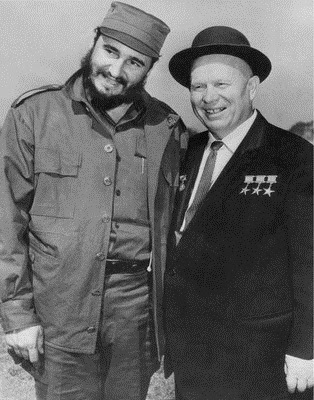Philosophy and Religion, Part 10a
Fidel Castro with Nikita Kruschev
Cuba, Kruschev and the 20th CPSU Congress
This Communist University has
constantly upheld the central idea within Marx’s “Capital” and within Paulo
Freire’s “Pedagogy of the Oppressed”. That idea is the full restoration of the
human Subject as an individual, within human society, making humanity out of a
material world.
This dialectic of the
individual and the collective was most succinctly expressed by Karl Marx and
Frederick Engels in the following famous words, which we have quoted more than
once before, from the Communist Manifesto of 1848:
“… the free development of each is the
condition for the free development of all.”
The Communist University has
also upheld the SACP’s constitutional stricture to “Educate, Organise and
Mobilise”. We do so in the conviction that our mission is not to Influence, or
to Guide. Such words are used when education is abandoned by those who have no
faith in it. “Influence” and “Guide” are only stalking-horses for “Command” and
“Control” when the latter two tyrants are too ashamed to raise their heads.
In its Freirean educational
practice, the Communist University has never sought to preach. It has opened
doors to dialogue and never closed them. The Communist University codifies, but
it does not prescribe.
When education succeeds, and
the working class is restored to its full humanity as a Subject of History,
then why would any of these insecure and furtive options (Influence, Guiding,
Command and Control) be required? None of them will be required.
Hence we say as Communist
University: Education is the means by which organising and mobilising are done.
Education is more than a preparation for politics. Education is the method of
politics and the very substance of politics, which, when considered broadly,
excludes all other substances. Education is the essence of humanism.
This message is simple, and
the Freirean method of carrying it out is clear. For now, the best illustration
of the idea of education as the substance of political practice is Cuba, a
country that has become one big university - a “society of knowledge”. Please
see the article (download linked below) by Cliff DuRand for an exposition of
this concept, including the “Universalization of the
University”.
In addition, and to make the
same point in a different way, we give a (downloadable below) example and a
warning of the manner in which a previous revolutionary upsurge faced the
problem of the revolutionary Historical Subject, and failed to solve it, with
disastrous consequences.
The All-Union Communist Party
(Bolsheviks), Short Course (a.k.a. simply “Short Course” was an
attempt to create, from the history of the Communist Party of the Soviet Union
up to 1937, a totalised theory, free of error, for the Soviet Union itself and
for the world communist movement as a whole. We came across it while studying Christopher Caudwell through
Helena
Sheehan, and finding material on J D Bernal and J B S Haldane on Sheehan’s web site. This material mentions
the Short Course and the failure of
the latter two otherwise outstandingly independent-minded communist scientists
to oppose it.
The physical torture and
elimination of comrades in the Soviet Union were shrouded in secrecy and
obscurity, and even the “show trials” that took place were to the Western
communist observers problematic because of the confessions of the accused. Yet
the CPSU of the day did have to “lay out its stall” in public, as all political
organisations are forced to do. The CPSU did so in the form of the All-Union Communist Party (Bolsheviks),
Short Course, and this document gave their game away completely, to anyone
with eyes to see. Yet leading Western communists preferred not to see what was
in front of their eyes.
The Marxists Internet Archive
in 2008 put up the All-Union Communist Party
(Bolsheviks), Short Course in full for all to read. In addition it
has Khrushchev’s 1956 speech
to the 20th Congress of the
CPSU, denouncing both Stalin and the Short Course. An extract from that speech pertaining to the Short Course is linked below.
With the Short Course, the core reversal or perversion of the CPSU in the
Stalin period is laid bare. For a quick grasp of this inversion of communism
see the work’s Conclusion. Interrogate
it with the Fundamental Question of Philosophy, with which we began this
10-part course: How stands the relation between Subject and Object? In the Short Course, the Subject of History is
not educated, but is “guided”. Herein lies the whole disaster.
It was a practical certainty
that the leadership of our South African Revolution would again at some point
make the same error of attempting to demolish the popular Subject. Under
President Mbeki, that is what happened. It is bound to be the case that another
such revolutionary crisis will arrive, perhaps soon. This Communist University
course, and the whole of the Communist University initiative, is dedicated to
the victory of popular agency in that struggle, and in all such struggles
thereafter.
People’s Education for
People’s Power!
Power to the People!
·
The above is to
introduce the original reading-texts: Cuba - A Nation Becoming
a University, DuRand, MRZine, and Khrushchev, 20th CPSU Congress, 1956,
Extracts re ‘Short Course’.



No comments:
Post a Comment